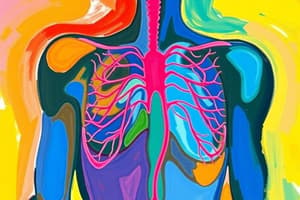Podcast
Questions and Answers
Which glands are classified as endocrine glands?
Which glands are classified as endocrine glands?
- Thyroid and testes (correct)
- Salivary and adrenal
- Pituitary and liver (correct)
- Sweat and pancreas
What is the main function of Growth Hormone (GH)?
What is the main function of Growth Hormone (GH)?
- Promotes growth and protein synthesis (correct)
- Inhibits lactation
- Regulates water balance
- Stimulates insulin secretion
Which hormone is responsible for stimulating the synthesis and secretion of thyroid hormones?
Which hormone is responsible for stimulating the synthesis and secretion of thyroid hormones?
- Follicle-stimulating hormone (FSH)
- Luteinizing hormone (LH)
- Adrenocorticotropic hormone (ACTH)
- Thyroid-stimulating hormone (TSH) (correct)
How does the anterior pituitary respond to hypothalamic hormones?
How does the anterior pituitary respond to hypothalamic hormones?
What is the role of prolactin (PRL) in the endocrine system?
What is the role of prolactin (PRL) in the endocrine system?
What condition results from excess growth hormone (GH) secretion during early life?
What condition results from excess growth hormone (GH) secretion during early life?
Which hormone is involved in regulating water retention in the kidneys?
Which hormone is involved in regulating water retention in the kidneys?
Acromegaly typically results in which of the following physical changes?
Acromegaly typically results in which of the following physical changes?
Which gland is located inferior to the larynx and produces thyroid hormones?
Which gland is located inferior to the larynx and produces thyroid hormones?
What is the role of parafollicular cells in the thyroid gland?
What is the role of parafollicular cells in the thyroid gland?
Flashcards
Endocrine glands
Endocrine glands
Glands that secrete hormones directly into the bloodstream, without ducts.
Hypothalamus
Hypothalamus
A key structure connecting the nervous and endocrine systems, responsible for releasing hormones that control the pituitary gland.
Anterior pituitary
Anterior pituitary
The anterior pituitary is controlled by the hypothalamus through releasing and inhibiting hormones, and it plays a major role in regulating other endocrine glands.
Tropic hormones
Tropic hormones
Signup and view all the flashcards
Growth hormone (GH)
Growth hormone (GH)
Signup and view all the flashcards
Gigantism
Gigantism
Signup and view all the flashcards
Acromegaly
Acromegaly
Signup and view all the flashcards
Posterior Pituitary
Posterior Pituitary
Signup and view all the flashcards
Antidiuretic Hormone (ADH)
Antidiuretic Hormone (ADH)
Signup and view all the flashcards
Thyroid Gland
Thyroid Gland
Signup and view all the flashcards
Study Notes
Endocrine System Overview
- The endocrine system is a system of ductless glands that secrete hormones directly into the interstitial fluid, which then diffuses into the bloodstream.
- Exocrine glands, in contrast, secrete products through ducts.
- Endocrine glands include the pituitary, thyroid, parathyroid, adrenal, pineal glands, hypothalamus, thymus, pancreas, ovaries, testes, kidneys, stomach, liver, small intestine, skin, heart, adipose tissue, and placenta.
Endocrine Glands
- Endocrine glands secrete hormones into the interstitial fluid, which diffuses into the bloodstream.
- These hormones regulate many bodily functions, including metabolism, growth, reproduction, and stress response.
- Specific glands and their functions are detailed below:
Hypothalamus and Pituitary Gland
- The hypothalamus is a major link between the nervous and endocrine systems.
- The pituitary gland is attached to the hypothalamus by the infundibulum.
- The pituitary gland has two parts: anterior (adenohypophysis) and posterior (neurohypophysis).
- Hormones released by the posterior pituitary are synthesized by the hypothalamus and stored in the posterior pituitary before release.
- The anterior pituitary's hormone release is stimulated by hormones released from the hypothalamus.
Anterior Pituitary Hormones
- Hormones from the anterior pituitary are stimulated by hormones from the hypothalamus.
- Growth hormone (GH), stimulates growth and protein synthesis.
- Thyroid-stimulating hormone (TSH) stimulates thyroid hormone release
- Follicle-stimulating hormone (FSH) stimulates egg development and sperm production.
- Luteinizing hormone (LH) triggers ovulation and testosterone production.
- Prolactin (PRL) promotes milk production.
- Adrenocorticotropic hormone (ACTH) stimulates hormone release from the adrenal cortex.
Posterior Pituitary Hormones
- The posterior pituitary stores and releases hormones made by the hypothalamus.
- Oxytocin stimulates uterine contractions and milk letdown.
- Antidiuretic hormone (ADH, vasopressin) regulates water reabsorption in the kidneys.
Thyroid Gland
- The thyroid gland is located inferior to the larynx and produces thyroid hormones (T3 and T4).
- Thyroid hormones regulate metabolism and stimulate protein synthesis.
- Parafollicular cells produce calcitonin, which lowers blood calcium levels.
Parathyroid Glands
- Embedded in the thyroid gland, typically 4, these glands produce parathyroid hormone (PTH).
- PTH is a primary regulator of calcium, magnesium and phosphate ions in the blood. It increases osteoclast activity resulting in bone resorption.
Adrenal Glands
- Two distinct parts, adrenal cortex and adrenal medulla, have distinct functions.
- Adrenal Cortex: Produces steroid hormones which affect glucose homeostasis.
- Mineralocorticoids (e.g., aldosterone) regulate water and electrolytes.
- Glucocorticoids (e.g., cortisol) regulate glucose metabolism.
- Sex hormones (e.g., androgens) contribute to secondary sex characteristics.
- Adrenal Medulla: Produces epinephrine and norepinephrine (catecholamines). These hormones intensify sympathetic responses.
Pancreatic Islets
- Pancreatic islets contain alpha, beta, delta, and F cells
- Alpha cells make glucagon, which raises blood glucose levels.
- Beta cells produce insulin, lowering blood glucose levels.
- Delta cells release somatostatin, inhibiting both insulin and glucagon.
- F cells produce pancreatic polypeptide, inhibiting digestive enzyme secretion and gallbladder contraction.
Ovaries and Testes
- Testes produce testosterone.
- Both ovaries and testes produce hormones to regulate reproductive function; Ovaries produce estrogen and progesterone.
Pineal Gland
- Located in the brain, the pineal gland produces melatonin.
- Melatonin influences the biological clock and is secreted more during darkness.
Endocrine Gland Disorders
- Gigantism, acromegaly, dwarfism
- Goiter, galactorrhoea, amenorrhoea, sterility (female or male)
- Simmond disease, diabetes insipidus, Graves' disease, Cushing syndrome.
Studying That Suits You
Use AI to generate personalized quizzes and flashcards to suit your learning preferences.




